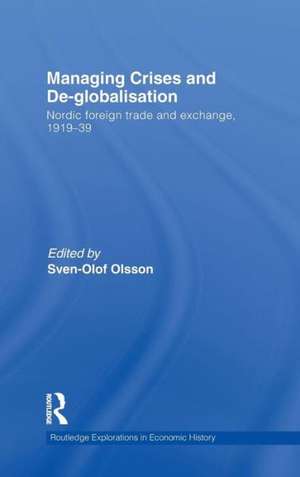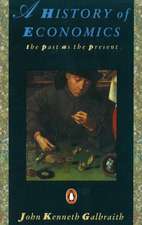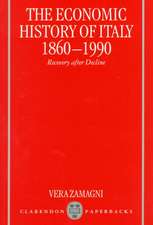Managing Crises and De-Globalisation: Nordic Foreign Trade and Exchange, 1919-1939: Routledge Explorations in Economic History
Editat de Sven-Olof Olssonen Limba Engleză Hardback – 30 noi 2009
The paradox is that in spite of international trade wars and regulated exchange the Nordic countries managed better than other European states during the interwar period, and that the Great Depression was not as deep or long lasting as in other countries. The chapters in this book discuss why and how this rather successful Nordic experience was achieved. The topics covered include commercial and monetary policies but also important industries such as forestry, agriculture and fishing. Many of the chapters are comparative and discuss economic developments in two or more Nordic countries.
| Toate formatele și edițiile | Preț | Express |
|---|---|---|
| Paperback (1) | 484.47 lei 6-8 săpt. | |
| Taylor & Francis – 23 iun 2014 | 484.47 lei 6-8 săpt. | |
| Hardback (1) | 1059.84 lei 6-8 săpt. | |
| Taylor & Francis – 30 noi 2009 | 1059.84 lei 6-8 săpt. |
Din seria Routledge Explorations in Economic History
- 9%
 Preț: 934.30 lei
Preț: 934.30 lei -
 Preț: 154.97 lei
Preț: 154.97 lei -
 Preț: 309.99 lei
Preț: 309.99 lei -
 Preț: 389.39 lei
Preț: 389.39 lei -
 Preț: 309.12 lei
Preț: 309.12 lei -
 Preț: 326.97 lei
Preț: 326.97 lei -
 Preț: 371.51 lei
Preț: 371.51 lei -
 Preț: 312.65 lei
Preț: 312.65 lei -
 Preț: 310.84 lei
Preț: 310.84 lei -
 Preț: 325.09 lei
Preț: 325.09 lei - 8%
 Preț: 390.79 lei
Preț: 390.79 lei -
 Preț: 422.00 lei
Preț: 422.00 lei - 18%
 Preț: 1113.95 lei
Preț: 1113.95 lei - 25%
 Preț: 824.17 lei
Preț: 824.17 lei - 18%
 Preț: 1061.06 lei
Preț: 1061.06 lei - 21%
 Preț: 304.74 lei
Preț: 304.74 lei - 18%
 Preț: 1056.95 lei
Preț: 1056.95 lei -
 Preț: 419.50 lei
Preț: 419.50 lei - 29%
 Preț: 1193.01 lei
Preț: 1193.01 lei - 18%
 Preț: 1055.21 lei
Preț: 1055.21 lei - 18%
 Preț: 1175.51 lei
Preț: 1175.51 lei - 25%
 Preț: 766.65 lei
Preț: 766.65 lei - 18%
 Preț: 1433.54 lei
Preț: 1433.54 lei - 18%
 Preț: 1163.63 lei
Preț: 1163.63 lei -
 Preț: 484.47 lei
Preț: 484.47 lei - 25%
 Preț: 997.11 lei
Preț: 997.11 lei - 18%
 Preț: 1385.39 lei
Preț: 1385.39 lei - 25%
 Preț: 855.59 lei
Preț: 855.59 lei - 18%
 Preț: 1077.57 lei
Preț: 1077.57 lei - 18%
 Preț: 1166.80 lei
Preț: 1166.80 lei - 18%
 Preț: 1126.82 lei
Preț: 1126.82 lei - 28%
 Preț: 851.46 lei
Preț: 851.46 lei - 18%
 Preț: 1175.01 lei
Preț: 1175.01 lei - 42%
 Preț: 195.71 lei
Preț: 195.71 lei - 18%
 Preț: 1057.05 lei
Preț: 1057.05 lei - 18%
 Preț: 1334.10 lei
Preț: 1334.10 lei - 43%
 Preț: 216.41 lei
Preț: 216.41 lei - 26%
 Preț: 822.54 lei
Preț: 822.54 lei - 18%
 Preț: 1168.09 lei
Preț: 1168.09 lei - 25%
 Preț: 1482.69 lei
Preț: 1482.69 lei - 18%
 Preț: 1164.92 lei
Preț: 1164.92 lei -
 Preț: 485.99 lei
Preț: 485.99 lei - 18%
 Preț: 1065.06 lei
Preț: 1065.06 lei - 18%
 Preț: 1058.79 lei
Preț: 1058.79 lei - 18%
 Preț: 1064.70 lei
Preț: 1064.70 lei - 26%
 Preț: 821.53 lei
Preț: 821.53 lei
Preț: 1059.84 lei
Preț vechi: 1292.49 lei
-18% Nou
Puncte Express: 1590
Preț estimativ în valută:
202.79€ • 211.74$ • 167.84£
202.79€ • 211.74$ • 167.84£
Carte tipărită la comandă
Livrare economică 05-19 aprilie
Preluare comenzi: 021 569.72.76
Specificații
ISBN-13: 9780415561723
ISBN-10: 0415561728
Pagini: 240
Ilustrații: 24 tables and 16 line drawings
Dimensiuni: 156 x 234 x 18 mm
Greutate: 0.6 kg
Ediția:1
Editura: Taylor & Francis
Colecția Routledge
Seria Routledge Explorations in Economic History
Locul publicării:Oxford, United Kingdom
ISBN-10: 0415561728
Pagini: 240
Ilustrații: 24 tables and 16 line drawings
Dimensiuni: 156 x 234 x 18 mm
Greutate: 0.6 kg
Ediția:1
Editura: Taylor & Francis
Colecția Routledge
Seria Routledge Explorations in Economic History
Locul publicării:Oxford, United Kingdom
Public țintă
Postgraduate and UndergraduateCuprins
1. Introduction 2. British-German rivalry in Northern Europe revisited Patrick Salmon 3. Nordic trade cooperation in the 1930s Sven-Olof Olsson 4.Why did Norwegian trade become more active in the interwar period? Monica Værholm 5. Effective protection, prices and GDP growth: Tariffs in Finland during the interwar period Jari Kauppila 6. Re-examining Norwegian monetary policy in the 1930s Lars Fredrik Øksendal 7. Danish exchange rate policy and and economic Interest groups: the interwar experience Hans Kryger Larsen 8. Norway’s and Sweden’s bilateral exchange clearing with Germany during the 1930s Peter Hedberg 9. The Scandinavian food system between organisation and state Flemming Just 10. Trade crisis and regulation of the farm sector: Sweden in the interwar years Mats Morell 11. Comparing the Icelandic and Norwegian fisheries’ responses to the economic crisis of the 1930s Guðmundur Jónsson 12. The state and the formation of the fishing industry: Denmark in the interwar period Morten Karnøe Søndergaard 13. Cartels in the Swedish forest industry in the interwar period Birgit Karlsson 14. Big business, market power and small nations: The Norwegian aluminium and nickel industry 1920-39 Pål Sandvik & Espen Storli
Notă biografică
Sven-Olof Olsson is Assistant Professor at the Department of Economic History in the Faculty of Social Sciences at Gothenburg University, Sweden.
Descriere
This book examines the effects of the Great Depression on the Nordic states in the interwar years, focusing on commercial and monetary policies but also important industries such as forestry, agriculture and fishing.

















